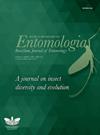Temporal variation and spatial distribution of the pest insect Edessa meditabunda in cotton (Gossypium hirsutum) as an alternative host plant
IF 0.7
4区 农林科学
Q4 ENTOMOLOGY
引用次数: 3
Abstract
ABSTRACT Cotton is an alternative host for Edessa meditabunda (Hemiptera: Pentatomidae), especially after the soybean harvest in surrounding areas, when large numbers of insects invade cotton fields and damage reproductive structures such as flowers and developing bolls. However, no studies on its occurrence and spatial distribution have been conducted in cotton. Therefore, this study was aimed to assess the temporal variation and spatial distribution of E. meditabunda in the alternative host plant, Gossypium hirsutum. The study was carried out in an area of 1.1 ha planted with cotton that was divided in 64 plots of 169 m2 each, where entire cotton plants were examined weekly and E. meditabunda nymphs and adults were counted. Dispersion rates and theoretical frequency distributions were calculated and analyzed with significance level at 5%. Assessments were carried out from seedling emergence until the appearance of bolls, but E. meditabunda was present only during the reproductive stage of cotton plants. This study detected the dispersal of this stink bug from late-cycle soybean fields to cotton, indicating cotton’s potential as an alternative host plant, providing shelter and food. Based on aggregation indices, the spatial distribution of nymphs and adults in cotton was aggregated at the beginning of the infestation, but tended toward randomness as bolls reached maturity. The occurrence of E. meditabunda in cotton was best described by the Poisson distribution with significance level at 5%.棉花(Gossypium hirsutum
摘要棉花是Miditabunda(半翅目:Pentatomunda)的替代宿主,尤其是在周边地区大豆收获后,大量昆虫入侵棉田,破坏花朵和发育中的棉铃等生殖结构。然而,尚未对其在棉花中的发生和空间分布进行研究。因此,本研究旨在评估E.meditabunda在替代寄主植物陆地棉中的时间变化和空间分布。这项研究是在种植棉花的1.1公顷区域内进行的,该区域被划分为64个地块,每个地块169平方米,每周对整株棉花进行检查,并对中圆线虫若虫和成虫进行计数。计算并分析了色散率和理论频率分布,显著性水平为5%。从幼苗出现到棉铃出现都进行了评估,但E.meditabunda只在棉花植株的繁殖阶段出现。这项研究检测到这种蝽从晚周期大豆田传播到棉花,表明棉花有潜力成为替代寄主植物,提供住所和食物。基于聚集指数,棉花若虫和成虫的空间分布在虫害初期是聚集的,但随着棉铃成熟,空间分布趋于随机。棉花中E.meditabunda的发生最好用泊松分布来描述,显著性水平为5%。
本文章由计算机程序翻译,如有差异,请以英文原文为准。
求助全文
约1分钟内获得全文
求助全文
来源期刊
CiteScore
1.50
自引率
12.50%
发文量
14
审稿时长
6-12 weeks
期刊介绍:
Information not localized

 求助内容:
求助内容: 应助结果提醒方式:
应助结果提醒方式:


